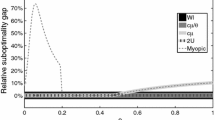Abstract
We consider a finite-population queueing system with heterogeneous classes of customers and a single server. For the case of nonpreemptive service, we fully characterize the structure of the server's optimal service policy that minimizes the total average customer waiting costs. We show that the optimal service policy may never serve some classes of customers. For those classes that are served, we show that the optimal service policy is a simple static priority policy. We also derive sufficient conditions that determine the optimal priority sequence.
Similar content being viewed by others
References
M.J. Chandra and R. G. Sargent, A numerical method to obtain the equilibrium results for the multiple finite source priority queueing model. Management Science 29 (1983) 1298–1308.
M.J. Chandra, A study of multiple finite-source queueing models. Journal of the Operational Research Society 37 (1986) 275–283.
C. Courcoubetis and P.P. Varaiya, Serving process with least thinking time maximizes resource utilization. IEEE Transactions on Automatic Control AC-29 (1984) 1005–1008.
C. Derman, G.J. Lieberman, and S.M. Ross, On the optimal assignment of servers and a repairman. Journal of Applied Probability 17 (1980) 577–581.
D.A. Elsayed, An optimum repair policy for the machine interference problem. Operational Res. Soc. 32 (1981) 793–801.
E. Frostig, Optimal policies for machine repairmen problems. Journal Applied Probability 30 (1993) 703–715.
V. Hodgson and T.L. Hebble, Nonpreemptive priorities in machine interference. Operations Research 15 2 (1967) 245–253.
Y.C. Hsieh, Optimal assignment of priorities for the machine interference problems. Microelectron. Reliab. 37 (1996) 635–640.
S.M.R. Iravani and B. Kolfal, When does cµ rule apply to finite-population queueing systems? Operations Research Letters 33 (2005) 301–304.
S.M.R. Iravani and V. Krishnamurthy, Workforce agility in repair and maintenance environments. To appear in Manufacturing and Service Operations Management (2004).
S.M.R. Iravani, V. Krishnamurthy, and G.H. Chao, Optimal server scheduling in nonpreemptive finite-population queueing systems. Working paper. Full version of this paper. Department of Industrial Engineering and Management Sciences, Northwestern University, Evanston, IL (2006).
G. Koole and M. Vrijenhoek, Scheduling a repairman in finite source systems, Mathematical Methods of Operations Research 44 (1996) 333–344.
T. Lehtonen, On the optimal policies of an exponential machine repair problem. Naval Research Logistics Quarterly 31 (1984) 173–181.
R. Righter, Optimal policies for scheduling repairs and allocating heterogeneous serves. Journal Applied Probability 33 (1996) 536–547.
K.E. Stecke and J.E. Aronson, Review of operator machine interference models. International Journal of Production Research 23 (1985) 129–151.
K.E. Stecke, Machine interference: Assignment of machines to operators. Handbook of Industrial Engineering, Second Edition (1992) 1460–1494.
Author information
Authors and Affiliations
Rights and permissions
About this article
Cite this article
Iravani, S.M.R., Krishnamurthy, V. & Chao, G.H. Optimal server scheduling in nonpreemptive finite-population queueing systems. Queueing Syst 55, 95–105 (2007). https://doi.org/10.1007/s11134-006-9006-5
Received:
Revised:
Published:
Issue Date:
DOI: https://doi.org/10.1007/s11134-006-9006-5




